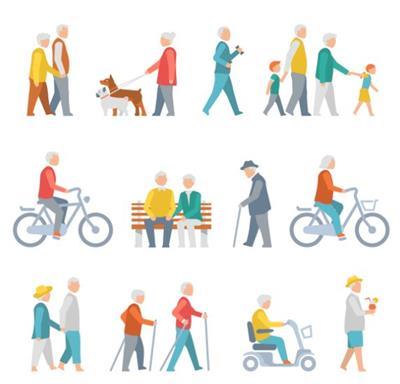
Active Aging Week takes place each year during the last week of September. The weeklong campaign calls attention to and wholeheartedly celebrates the positivity of aging today.
The objective of the annual health-promotion event is to give as many older adults as possible the means to experience wellness activities and exercise in a safe, supportive environment. It also promotes the benefits of healthier, more active lifestyles across the lifespan.
In the spirit of this even, I’ll share with you the benefits of keeping the mind and body active and strong so that they can continue to work well with each other.
Keeping Your Brain in Shape
Physical fitness gets plenty of attention, and for good reason. A healthy body can prevent conditions such as heart disease and diabetes, and help you maintain independence as you age.
Mental fitness is just as important as physical fitness, and shouldn’t be neglected. Including mental dexterity exercises into your daily routine can help you reap the benefits of a sharper mind and a healthier body for years to come.
Mental fitness means keeping your brain and emotional health in tip-top shape. It doesn’t mean training for “brain Olympics” or acing an IQ test. It refers to a series of exercises that help you slow down, decompress, and boost memory
The Mind-body Connection
It’s no surprise that the more you help your body, the more you help your mind. Physical activity increases the flow of oxygen to your brain. It also increases the amount of endorphins, the “feel-good” chemicals in your brain. For this reason, it’s not surprising that people who are in good physical shape also tend to enjoy a higher level of mental agility.
Engaging in a vigorous physical workout can help you battle depression and gain a more positive outlook on life. It’s also a great way to beat harmful stress. Mental exercise is just as beneficial. Staying active in old age may help preserve your memory and thinking skills, a new study suggests.
In fact, older people who were physically active kept their minds sharp, even if their brains showed signs of lesions or other markers linked to Alzheimer's disease or other dementias, researchers found.
Physical activity may provide a cognitive reserve that helps preserve the brain even in the face of dementia, according to lead researcher Dr. Aron Buchman, professor of neurology at Rush University Medical Center in Chicago.
For the study, Buchman's team looked at 454 older adults. There were 191 who had dementia and the rest did not. Participants had physicals and tests of memory and thinking skills every year for 20 years. All agreed to donate their brains for research after death.
About two years before death, each participant was asked to wear a device called an accelerometer, which measured their physical activity around the clock. Their activities included cleaning house and exercise routines. Researchers found that participants who were the most active had better thinking and memory skills than those who had led more sedentary lives.
Participants who had better motor skills, ones that help with movement and coordination, also had better thinking and memory skills. The link between higher activity and better thinking remained consistent whether a participant had dementia or not. Buchman's group found that increasing motor skills were linked to a 55 percent lower risk of dementia.
Improving Physical Fitness
Not only does physical activity improve mental abilities, there are conditions that can affect the brain's ability to function, such as stroke, are associated with diet, and lower levels of physical activity.
At least 30 minutes of moderate exercise every day delivers an oxygen boost to the brain that improves health and function. If it’s difficult to tolerate 30 minutes of exercise all at once, split up the activity throughout the day. Exercising in three 10-minute blocks is enough to deliver significant health benefits.
We’ve all heard that walking is one of the most beneficial forms of physical activity that we can do. It’s easy, inexpensive, and can be done almost anywhere. Swimming, yoga, and housework can also provide a great workout.
Improving Mental Fitness
Your brain is like a muscle, and it gets stronger the more you use it. You can exercise your brain with stimulating conversations, by reading newspapers, magazines and books, and by playing 'thinking' games like Scrabble, cards and Trivial Pursuit.
New learning expands and stretches the brain. Take a course on a subject that interests you, cultivate a new hobby, or learn a language.
Problem solving keeps the brain sharp and creative. Crossword puzzles, word games, chess, and card games can all help improve memory, critical thinking, and problem solving.
The Role of Hypnosis
Hypnosis can be beneficial to older adults who want to become more active in many ways. Hypnosis is successful in managing and reducing pain, increasing the motivation to exercise, creating healthier eating habits, improving memory and concentration, and overcoming fears and limiting beliefs.
Another great use of hypnosis is simply being in the state of hypnosis. The trance state of hypnosis physically and mentally mimics deep sleep, activating the same brain waves as REM sleep. In that trance, the body begins healing and restorative processes, just like in sleep.
The versatility and effectiveness of hypnosis means that you don’t have to wait to be sick or have a problem before you use it. Hypnosis can be part of an effective health maintenance routine, like brushing your teeth and daily exercise.∎
Use this link to get a free 15 minute hypnosis audio for stress relief.
http://www.greenmountainhypnosis.com/StressFreeAudio.html
Karen Gray is a Certified Professional Hypnotist, a Certified Hypnosis Instructor, a Registered Nurse, and the Director of Green Mountain Hypnosis. For more information on how you can use hypnosis to change your life, contact Karen at karengray@greenmountainhypnosis.com, or (802) 566-0464.